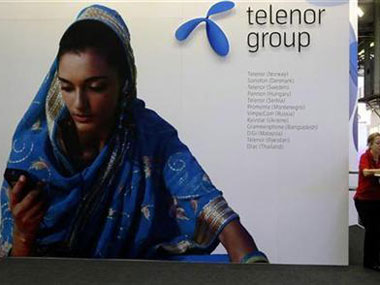Something is surely wrong if Company A pays off debts owed by Company B which it does not own fully.
Telenor of Norway has announced that it is clearing debts worth a staggering Rs 9,809 crore owed by its 67 percent subsidiary Uninor to banks that were getting jittery about their loans.
According to BusinessLine, the loans are owed by Uninor, and Telenor as guarantor has paid them off even though a third of the loans are owed by Unitech, Telenor’s estranged 33 percent business partner in the telecom venture. All its licences were cancelled by the Supreme Court judgment on the 2G scam this February.
A Uninor statement made it clear why it was paying off the banks. “One of Uninor’s shareholders has repeatedly refused to fund the company through its own funds and has also actively worked to stop the majority shareholder from doing so. In the absence of a rights offer, Uninor has relied on short-term loans from Indian and international banks that were fully guaranteed by Telenor Group. Consequently, fulfilling its guarantees, Telenor Group has directly settled all of Uninor’s loans amounting to Rs. 9,809 crore with the respective banks. This allows Uninor to continue its current operations.”
What this means is that Uninor is now a debtor to Telenor - and the latter can enforce its claims against Uninor, and even shut it down, though that’s a long process.
For starters, it’s obvious that the Telenor-Unitech joint venture wasn’t a marriage made in heaven. As if the mismatch of a telecom company tying the knot with a realty major is not enough, the partners also had different attitudes to equity and debt - a very fundamental disagreement for capital-intensive projects.
Unitech has managed to stall all of Telenor’s efforts to end the marriage by moving the Company Law Board (CLB) and the courts. The latest move by Uninor to auction its assets to Telenor is also stuck in the works, and the court has been moved. The Delhi High Court has allowed Uninor to invite expressions of interest for its assets, but can’t proceed with the auction till the court takes a call.
Impact Shorts
More ShortsWhy can’t Indian joint ventures with foreign companies agree to no-fault divorces instead of wasting their own time and money, not to speak of the CLB’s and courts’ time?
The answer has to be sought in Indian law, and the wages of crony capitalism.
India allows foreign players to hold 74 percent in telecom companies, and this means the domestic partner, despite putting in very little money, can block any major decisions of the foreign investor.
[caption id=“attachment_424469” align=“alignleft” width=“380”]  Uninor is now a debtor to Telenor - and the latter can enforce its claims against Uninor, and even shut it down, though that’s a long process. Reuters[/caption]
The law that forces foreign companies to take on Indian partners is ostensibly intended to ensure that a sensitive sector like telecom is not run to a foreign country’s advantage. But its actual effect is to ensure that the Indian partner can bully the partner, and also extract blood money for getting off his back.
A related problem is the tendency to finance heavy investments with debt rather than equity. Foreign partners prefer a judicious mix, but Indians prefer not to invest too much of their own cash. They expect banks to lend them huge amounts - and let the latter carry the can if anything goes wrong with the loan.
Banks can be bullied into imprudently lending lots of money and also forced to reschedule bad loans - as is happening with Kingfisher and Air India - when promoters have lots of clout. Where they lack clout, banks can grab their collateral. It is a moot point whether Telenor had to pay up because of this, or because it wants to tighten its grip on Uninor by making it a huge debtor to itself.
With the move to auction Uninor’s assets now stuck in court, Telenor may have chosen to pay off the banks to ensure that Unitech is slowly squeezed out of Uninor.
The Telenor-Unitech cold war is no advertisement for India Inc or the attractiveness of the Indian telecom sector.
So what is the way forward? Four points need to be made.
First, if the idea of policy-makers is that 26 percent must always be in Indian hands, the law must ensure that the Indian partner actually has the money to keep raising his equity stake when investments have to go up.
Second, if no such Indian partner can be found, the government should itself enter the picture with a “golden share”, where it has a 26 percent veto, but with no economic interest. In short, the foreign investor can give the government 26 percent non-voting shares which carry no dividends or economic interest, but can be used to block resolutions that are not in the national interest - as deemed by a government resolution. The law may need to be tweaked for this, but this is a better option that letting Indian partners blackmail their foreign ones endlessly.
Three, the existing law of forcing foreign partners to give 26 percent seems designed to give Indian partners a guaranteed premium exit even though they may have brought no value to the venture beyond crony ties to politicians. For example, Vodafone, after it got rid of the Ruias of Essar for a prince’s ransom, is gifting Piramal Healthcare another small fortune because of this same 26 percent Indian shareholding rule.
Surely, the purpose of this stake limit is not to gift minority partners a free lunch? What is this free lunch if not evidence of crony capitalism, where the law more or less mandates a profit for the Indian partner?


)

)
)
)
)
)
)
)
)



